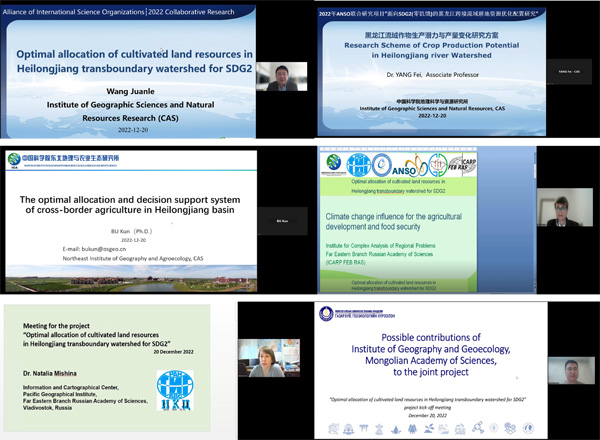ANSO Collaborative Research Project Launches “Optimal Allocation of Cultivated Land Resources in Heilongjiang Transboundary Watershed for SDG2”
On 20th December 2022, the kick-off and expert consultation meeting for ANSO Collaborative Research Project entitled “Optimal Allocation of Cultivated Land Resources in Heilongjiang Transboundary Watershed for SDG2” was held online.
Over 40 participants from the Institute of Geographic Sciences and Natural Resources Research (IGSNRR) of the Chinese Academy of Sciences (CAS), the Northeast Institute of Geography and Agroecology of CAS, Institute for Complex Analysis of Regional Problems, and Pacific Geographical Institute, two institutes of the Far Eastern Branch of the Russian Academy of Sciences, and the Institute of Geography and Geoecology of the Mongolian Academy of Sciences attended the meeting. The Principal Investigator, Prof. Wang Juanle from the IGSNRR, CAS hosted the meeting.
In the beginning part of the meeting, Dr. ZHAO Minyan from ANSO Secretariat congratulated on the launch of this project, and hoped that this project can strengthen the cooperation of scientific research institutions in the countries and regions involved in the Belt and Road Initiative, and build a more stable and diverse network. Prof. WANG Zhenbo, Director of the Department of External Cooperation of IGSNRR, expressed his gratitude to the support of ANSO. He introduced previous international cooperation basis of the institute, and hoped that more cooperation and exchanges could be achieved.
Prof. WANG Juanle generally presented the project through background, objectives & outputs, technical route, and working allocation & research plan. Prof. A. Grigorieva from Institute for Complex Analysis of Regional Problems, Far-Eastern Branch of the Russian Academy of Sciences elaborated on the work plan based on “The Impact of Climate Disasters on Agricultural Production” combined with the research basis of her own unit and scientific research team.
Based on the previous research results on land use and agricultural production monitoring in the Heilongjiang River Basin on Russia side, Prof. N. Mishina and Prof. A. Lankin from Pacific Geographical Institute, Far Eastern Branch of the Russian Academy of Sciences explained the potential contribution of the institute to the research of this project. Prof. L. Ochirkhuyag from Institute of Geography and Geoecology, Mongolian Academy of Sciences reported the development of the institute’s soil research field and the research involved, and the background and goals of this project. He suggested more consideration on the local agricultural development conditions and characteristics of the fieldwork areas be taken in the Mongolian part of the watershed, and looked forward to more contribution from all parties.
The guiding experts affirmed the feasibility of the implementation plan of collaborative program. They suggested effectively updating the food production assessment information, promoting cooperation in agricultural production management among countries in the Heilongjiang River Basin to cope with climate change, paying close attention to “optimization” and “allocation”, and dealing with the uncertainty of future extreme weather and disaster impacts.
Prof. WANG Zhenbo put forward to establish a joint laboratory in the region, effectively integrate data platform, academic exchange and other research resources and establish a long-term and open cooperative mode among institutes of China, Russia and Mongolia.
Dr. ZHAO hoped this project would make important contributions to the achievement of the UN SDGs and the building of a scientific and technological community with a shared future for mankind in the summary. She supported the establishment idea of the joint laboratory proposed in the discussion.

Project partner reports
Download attachments: